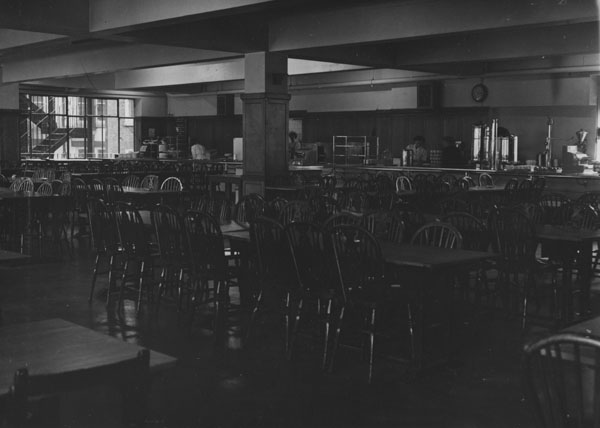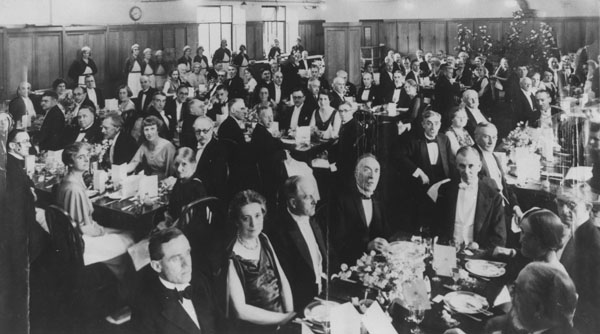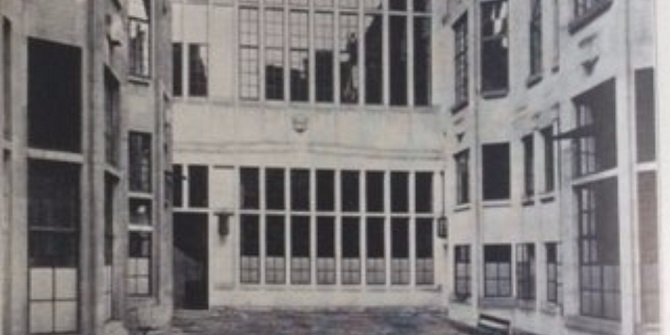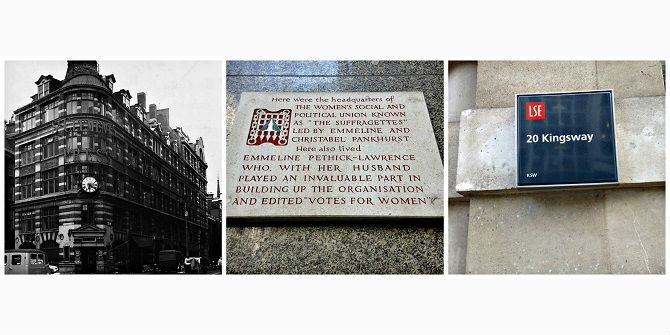The recently discovered “Refectory Suggestions and Complaints” provides some new insights into feeding staff and students at LSE. LSE Archivist, Sue Donnelly, explores the perennial problems of feeding hungry LSE students and staff.
The LSE Refectory was opened in 1907 and was a focal point of LSE life for both students and staff. LSE’s small size and lack of funding in its early days meant there was neither space nor money to provide staff and students with separate dining rooms and early students often mention the mingling of staff and students in the Refectory – although the School Director might dominate the central or “top” tables.
By 1933 the Refectory was managed by Mrs Atkin but following her retirement due to ill-health she was replaced by Miss M Rhys as Refectory Steward. The Refectory was open from 11am to 8.15pm in term time to provide both day and evening students with meals. There was also a café open each day from 10am to 6pm. The Refectory was waitress service and 400-500 lunches were served daily in term time.

The comments book begins on 17 January 1933 and reflects perennial concerns with prices, quality, space and service – as well as providing opportunities for students to display their sense of humour. The first comment in the book simply says “That the refectory be abolished” – on 19 January student P H Patel expands this slightly with his sensible suggestion that “Vegetarian dishes (especially at lunch time) should be introduced” though he continues “or else, the refectory better be abolished”.
The size and cost of tea, coffee, cakes and luncheon were under almost permanent discussion along with comparisons with other venues:
That the size of a 3d cup of coffee be increased to that obtainable at the ABC[1] & elsewhere and the 2d cup in proportion.
Politics made its way onto the menu on 5 May 1933:
Today May 5 we find ‘Imperial Pudding’ on the menu. Now that the raspberry season is approaching surely the Refectory could supply ‘Marxist Pie’ or some such concoction.
There were frequent calls for a boycott of the Refectory but as ever some students were concerned about the quality of the beer. On 29 November John Moss wrote:
May I suggest that care should be taken by staff in handling bottles of beer? The one I drank this evening tasted as if it had been shaken very much as a result was exceedingly ‘gassy’.

In 1935 there was a call for the ticket system to be removed and replaced by a cash register – “The ticket system would not work for a week in a public restaurant”. There were also hints that LSE students were defecting to King’s College refectory over the Strand where it was claimed prices were lower and quantities larger. However one loyal student stated:
Apart from the food, waitresses, service, prices, etc., the refectory is an excellent institution. The fact that you get better food and better service elsewhere is in my opinion entirely irrelevant – IT IS OUR REFECTORY EGAD!
Evening students trying to grab a quick meal between the end of the working day and beginning their studies felt that the Refectory should be open later and that day students should leave the common rooms in a better state. Other students made the suggestion that a table be provided for those students who, unable to afford the prices in the Refectory brought in their own meals.
Towards the end one entry claims to be by LSE co-founder, dramatist George Bernard Shaw:
That in the interests of the drama mangelwurzels and cabbage water be included in the menu. Enough of these pimply, pasty faced students. England wants healthy, robust young men to carry out her traditions in generations to come. I swim in the Serpentine every morning, and I’m 80. I suggest small Serpentines be available for students.
Behind the scenes the period up to 1 October 1935 was a difficult one for the refectory management. Mrs Atkin was suffering from ill-health and in 1933 had long periods of sick leave. In 1934 Mrs Mair, the School Secretary, began the search for a new Refectory Steward seeking recommendations from several domestic science colleges. One suggestion was Margery Rhys, then Head Cookery Mistress at the Aberdeen College of Domestic Science. She also supervised hostel catering staff and was responsible for the management of college functions.

Margery Rhys was the daughter of a Dorset clergyman who had undertaken training in Scotland and London and had managed a factory canteen in Silvertown before moving into teaching. She had written two books on advanced cookery and given broadcast lectures. Her references were good but the School were concerned that she lacked recent direct experience of managing a catering service. Finally on 23 May 1934 Margery Rhys was offered the post with a salary of £350 pa which she accepted. By 1936 her salary had risen to £400.
However it was clear that Margery Rhys was ambitious and between 1937 and 1939 she applied for various posts with the Board of Education working on school meals, Haileybury College and Gonville and Caius College, Cambridge. Now in her 40s she may have faced some ageism and the Cambridge College noted that they had appointed a younger woman they believed would adapt to the work better. But Mrs Mair clearly thought highly of Miss Rhys writing that:
Her quiet sense of humour and her kind, if shrewd, estimate of others enables her to keep the balance in the many problems which are bound to arise in a University refectory where the consumers range from very poor students with hearty appetites to professors and administrators with experienced tastes.
With the School’s evacuation to Cambridge in 1939 the Refectory was closed and Miss Rhys sought war work. She joined the Women’s Auxiliary Air Force initially training RAF cooks and catering staff and then becoming Steward at St Mary’s Hospital, RAF Halton near Wendover:
I already see that the difficulties of even attempting please the sisters and patients are almost going to beat the joys of battle that I used to have at LSE. Well I shall go down fighting as usual.
At the end of the war the problem of recruiting catering staff led the School to experiment with outsourcing to a catering firm and Miss Rhys took on the post of Catering Steward at the Royal Berkshire Hospital in Reading where she stayed until her retirement at 60 in 1953.
References
LSE/Small LSE Deposits/182 Refectory Suggestions and Complaints Book, 1933-1936
LSE/STAFF Files/Rhys Margery
[1] The Aerated Bread Company (ABC) was originally a bakery but became well known for running a large chain of tea rooms across the UK. There was an ABC tea room near St Clement Danes church.





